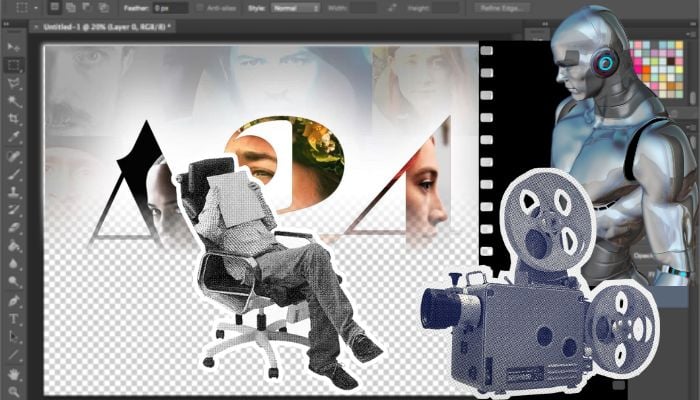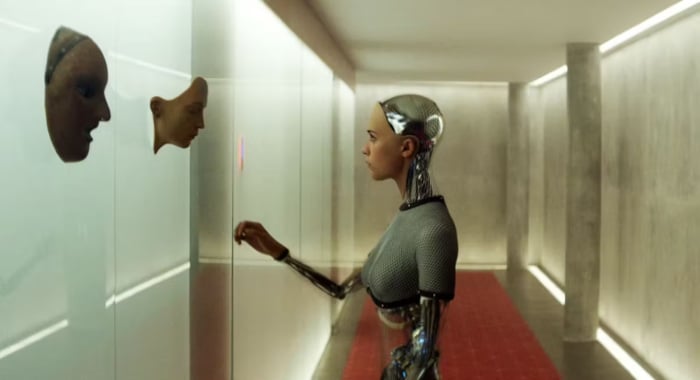Home / Entertainment
A24 backs AI: Reflections on cinema’s modern saviour endorsing a new ‘God’
Is it too early for the alarm bells to go off or must we ride out these choppy waters?

Much has been said, written, and heard about A24 ‘saving’ or ‘disrupting’ cinema — an idea which was conceived due to the fairly young film studio’s approach to not only the kind of films they distribute, but also the way they distribute them.
By their filmmaking collaborators’ own admission, A24 let their directors and writers soar as high as they liked while ensuring that their wings were not wax-made.
As a result, several Icarian creatives made the studio their home en route their flight to the sun, and A24 only but marked the distance — motivating others to gear up similar aspirations along the way.
“I had a film about a guy stealing milk and another one about a hurt bird and a ceramicist. They were up for it!” said Kelly Reichardt, the filmmaker behind A24 niche like First Cow and Showing Up, in a recent conversation with The New Yorker.
After a silent storm brewing beneath the surface forced a few cracks to reveal themselves in A24’s enterprising vessel, courtesy of a few recent AI blips which didn’t go unnoticed by avid film fans, it is a fact now well acknowledged that the independent studio has in fact set up an AI division within their base and is on its way to make the shift towards big Hollywood fare, the kind that is driven by big budgets.
Is it too early for the alarm bells to go off or must we ride out these choppy waters?
Origins of outrage
A24 caused a bit of an aggressive panic when their Alex Garland directed project Civil War was promoted via a series of AI generated film posters.
The post through which the posters were first teased, shared via Instagram, invited the wrath of loyal A24 followers.
“I don’t understand this campaign. U are selling a movie that doesn’t exist and it’s very bizarre. I love a24 with all my heart but i am so bloody confused about what happened with this film,” one impassioned comment read. (Sic)
While a source close to the movie’s team clarified that the pictures were created because they were a glimpse at imagery “inspired by the movie”.
“The entire movie is a big ‘what if’ and so we wanted to continue that thought on social — powerful imagery of iconic landmarks with that dystopian realism,” the insider explained.
However, the explanations weren’t enough (and they were never going to be) for the side which, in many ways, bestowed A24 the status it parades around today — the audience they first trusted to support their ambitions.
To boot the irony out of the park, one of Garland’s earlier projects with the studio was Ex Machina — a 2014 film starring Alicia Vikander, Domnhall Gleeson, and Oscar Isaac, which was a cautionary tale about the perils Artificial Intelligence is capable of unleashing into the human world.

Besides the Civil War controversy, A24 has had similar trouble due to their use of generative AI to fix its actors’ accents in last year’s The Brutalist, as well as the role which the tool played when the movie’s production design team required its help to create the initial sketches for the building structures displayed onscreen.
According to The New Yorker’s latest article which detailed the current proceedings at A24, including those towards incorporating AI, the tide of controversy is far from having subsided.
“Legacy studios such as Sony Pictures have attempted to buy a stake in A24; instead, the company has opted to take Wall Street money, preferring not to be drawn into what one executive called Hollywood’s ‘hundred years of doing things a certain way’,” read one part of A24’s Empire of Auteurs by Alex Barasch.
Important to note here is that Thrive Capital — a New York based capital firm — is the reason behind the studio’s generous estimation worth $3.5 billion.
However, the firm is also a major supporter of OpenAI, and if you were to think that A24 is stuck in a nasty equation with them because of the financial profits they owe to Thrive Capital’s backing, you would be wrong — the article claimed that “A24 courted the firm specifically for its artificial intelligence connections.”
Now, the entertainment company founded by Daniel Katz, John Hodges, and David Fenkel, also hosts tech entrepreneur Scott Belsky among their core team, and the former chief strategy officer at Adobe is set to lead technology and innovation as head of the A24 Labs — the studio’s tech division.
The foretold Butlerian Jihad
If Ari Aster were to be believed, it may already be “too late” to consider that AI can be manned.
“It’s obviously already too late. We’re in a race now,” the director behind films such as Hereditary, Midsommar, and the latest, Eddington — all A24 backed — told Letterboxd.
He further cautioned, “If you talk to these engineers and the people ushering this AI in, they don’t talk about AI as this great new medium; they don’t even talk about it as technology. They talk about it as a god. They talk like disciples. They’re very worshipful of this thing. Whatever space there was between our lived reality and this imaginal reality — that’s disappearing, and we’re merging, and that’s very frightening.”
The Dune universe includes the story of an event known as the Butlerian Jihad — a war against machines, which was won as a result of forcing the development of human minds through the promotion of humanity against artificiality.
Subsequently, the creation of smart machines is banned, specifically pertaining to that technology which can mimic humans.
Regardless of the event’s context within the literary series, the phrase is often used — at times, in mirth — to denote a similar sentiment or impending necessity for the real world.
As these things have a habit of turning out, fictitious events, often written with a considerable tinge of exaggeration, do not occur in reality as they do on paper.
Though many a time, one may look around and recognise life imitating art — both in good ways and bad.
It must be suggested therefore that if the artistic side — writers, directors, actors — feels any obligation towards curtailing the AI armed wave of darkness upon their creative expression, the need has already arisen for an uncompromisingly united front, if not an outright war.
The normalised usage of AI, which is well past threats and has its teeth halfway into the sanctity of our day-to-day lives, deserves nothing less than a firm refusal from cinema’s highest achievers, to clear the path for those still scaling the peak.
The final ambition

Going back to the Kelly Reichardt quote outlined at the beginning of this text, it wasn’t actually told in full.
What the filmmaker’s complete statement revealed was a bit unfortunate.
“I had a film about a guy stealing milk and another one about a hurt bird and a ceramicist. They were up for it! They might not have been up for it for a third film, but they were up for it for two,” is what she really said.
For the third title Reichardt referred to, look no further than the Josh O’ Connor starrer, The Mastermind, which debuted at Cannes earlier this year and is financed by Mubi.
Reflecting on her former studio’s move away from the willfully experimental oeuvre they initially came to be associated with, she said, “For someone like me, it’s a heartbreak.”
Mainstream success — which tends to translate into a profitable one — seems to be the end product for much of today’s art.
Not just studios, but countless artists are increasingly trading in their initially hard earned gradual success for the thrill of rapid prosperity, which comes from nothing less than a chilling smothering of their true creative sensibilities.
Greta Gerwig’s Barbie sized cheque which allowed her to open a deposit in the world of Narnia — her upcoming mega project for Netflix — can be counted as but one example.
Concerningly so, while a single artist can only afford to take a single job at a time which ensures financial success, companies like A24 are gearing towards creating multiple projects, which can earn them some quick cash, right alongside their other ambitions.
“You can maybe make something that’s valuable for a thousand people, because the cost is cheap enough that it doesn’t have to reach ten million people,” the A24 associate Ravi Nandan contributed in the New Yorker piece, while discussing projects aimed at “microcommunities”, which they claim are being helped by AI due to its quick use and cost effectiveness.
Must one, o wise Camus, still imagine Sisyphus happy?














